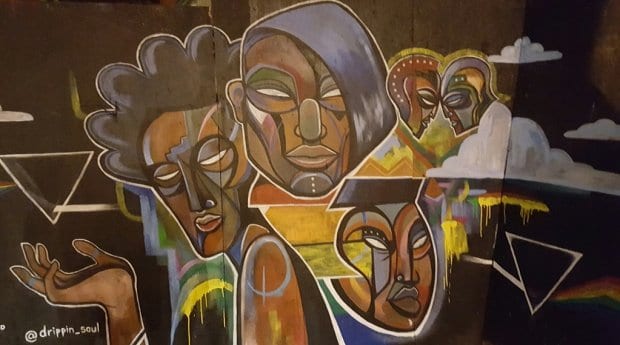Ottawa Mayor Jim Watson has expressed interest in finding a temporary exhibition space for a mural honouring trans women of colour that could in turn boost the mural’s likelihood of finding a permanent home.
Kalkidan Assefa, a local artist, painted a mural on Aug 23, 2015, as part of Queer Pride, a festival on Somerset Street organized by the Queer Mafia, the BlakCollectiv and other community organizations. When Ade B, a member of Queer Mafia and the BlakCollectiv, asked him to paint a mural, it led to a conversation about intersections of identities within communities of colour, Assefa says.
“We agreed the issue of violence directed at trans black women and trans women of colour is an issue that needed more attention,” he says. “BlakCollectiv members added the names of murdered black trans women from the past year and wrote the accompanying statement. My work is generally meant to be bright and uplifting, but I think it is more powerful when combined with the sombre reminder of why the piece is there in the first place.”
The mural’s accompanying text reads: “Rest in Power. #sayhername All Black Lives Matter because if your liberation is not bound up in mine, then what is the point?”
The piece is powerful, but Ade B wanted to find a permanent home for the mural, so she took to social media on Aug 24 and reached out to the mayor, seeking his support. On Aug 28, a media spokesperson responded to Daily Xtra’s request for comment by email.
“Mayor Watson is open to the idea of trying to find a place for the mural to be displayed temporarily as has been done in the past with things like the Witness Blanket,” says Brook Simpson, Watson’s press secretary. “A permanent installation at City Hall would be unlikely given the mural’s size but a temporary installation may serve to bring more exposure to the mural and help towards finding a suitable and permanent home for it.”
Ade B says she’s working on setting up a meeting with Watson to discuss possible venues for the mural.
“Ideally, I think it would be great to have it on Bank Street,” she says. “Bank Street is meant to be the LGBT street or the queer street for the city, so I think if we could find a space somewhere on Bank Street that would be great. I purposely haven’t really requested a specific location because I just don’t know the details of the city’s permissions and who owns what and who we have to talk to, so I kind of made the presumption that if Jim Watson was interested or could help it move forward, he would have access to information as to the options we have.”
The possibility of the mural finding a permanent home is a welcome surprise to the artist who painted it.
“When I painted it my expectation was that the mural would experience the same impermanence as most street art, being exposed to the public and natural elements, so anything more than that is awesome,” Assefa says.
Assefa and Ade B agree art is a powerful way to engage with people to raise their awareness of discrimination and marginalization. The violent oppression black trans women and trans women of colour face isn’t widely discussed and that lack of awareness is a problem, Ade B says.
“Of the people who are the most persecuted in our community, within the LGBT community, black trans women and trans women of colour exist within those intersections that mean they’re the most targeted,” she says. “We’re focusing so much on white, gay men but the people who are living in the most danger and also fighting the hardest are black trans women and trans women of colour who are being stalked, being searched, being beat up, being killed for just being, just walking. That’s the stuff that’s happening to them and no one really wants to talk about it, so it’s not getting addressed as fully as it should be.”
For Assefa, art is an important aspect not only of social justice movements, but also in healing on a personal and collective level.
“Art is a platform I’m privileged to have and over time I’m learning the importance of using it to honour and uplift those most affected, discriminated against and marginalized,” he says. “Artists have a voice and if that voice isn’t in the service of the people then it’s only serving yourself.”


 Why you can trust Xtra
Why you can trust Xtra


